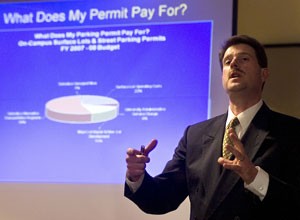As the UA campus continues to grow in population and expand in size, students are given more campus resources, from residence halls to recreational services. It is these same students and faculty, however, who are seeing the brunt of the other side of expansion in hundreds of lost parking spaces each semester.
When the decision was made to build new residence halls on the southwest and southeast corners of campus, the strategy included how best to deal with the almost 1,000 parking spaces being lost next semester.
Parking and Transportation Services is also dealing with the loss of spaces from the Student Recreation Center expansion project.
The problem is not a new issue for PTS. Over the past eight years, PTS has lost a total of 2,723 parking spaces, said PTS director Patrick Kass.
“”It’s already pretty difficult to find a spot,”” said Deanna Harvey, a mathematics education junior. “”A lot of people have to change their schedules and show up early just to find a spot.””
When the university undertakes construction projects, the new structures typically take the place of nearby surface parking lots. While PTS continues to build new lots and add parking garages in the place of surface lots, the rate of loss continually outweighs the rate of gained spaces, Kass said.
Although PTS will be adding 300 to 400 new spaces in Zone 1 and South of Sixth Street lots, the university will lose an estimated 1,200 more by next semester, said Bill Davidson, marketing specialist for PTS.
While the issue itself is not new, the current concern over campus parking comes from the accumulation of lost spaces over the years.
When compared to the growing population of students and staff on campus, the parking situation has become a dire concern as of late, Kass said.
While PTS currently manages 17,000 spaces for a campus population of more than 50,000, PTS must constantly balance the number of spaces with the expected number of students and staff parking on campus on any given day, Kass said.
PTS intentionally oversells these spots because of the varying schedules of those on campus. If too many permits are given out, many permit holders will be unable to find a space. If too few permits are given out, PTS will be unable to fund its own operations, Davidson said.
“”(There is) an increased cost of construction (and) increased university costs,”” Kass said. “”These are some issues we’re facing.””
PTS plans to combat parking issues by giving commuters other options, such as the CatTran and Night Cat services that allow students and staff to leave their vehicles at home.
The strategy includes increasing the number of people these services can assist, as well as approaching Sun Tran with a possible deal to give hefty discounts to riders of city transportation, Kass said.
These programs and improvements will come at a price though, as PTS plans to increase the price of parking permits by an average of $2 per month, he said.
“”As the campus grows, alternative transportation will become more and more important,”” Davidson said. “”It’s important that we keep up with the growth of the university.””
With the UA campus on the fringe of a parking catastrophe, thousands of students will have to adjust the way they get to the university, whether voluntarily or by force, said Nikisha McFall, a theatre education junior.
“”(Permits) are already expensive enough,”” she said. “”Nobody’s going to want to pay more.””
Kass sees this carpooling predicament as a blessing in disguise, since fewer vehicles on the road account not only for fewer cars on campus, but also help the environment by emitting less harmful gases, he said.
Although carpooling seems to be the answer, organizing an efficient carpooling system is a difficult prospect that ends up being more confusing than helpful. Because carpoolers are almost entirely dependent on each other’s schedules, students’ classes may be reliant on their personal parking situation, said Jon Black, a political science sophomore.
“”The line between parking and academics shouldn’t blur like that,”” he said. “”Your parking situation should be decided by your class schedule, not the other way around.””
Rather than being an isolated issue, the recent parking concerns are part of a much bigger problem that cannot be addressed solely by PTS and permit holders, McFall said.
“”This university is expanding too fast for itself,”” she said. “”That’s something that everyone needs to look at, not just parking and transportation.””









